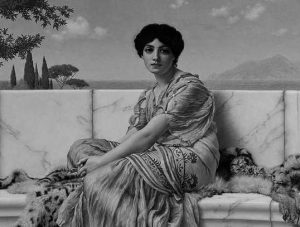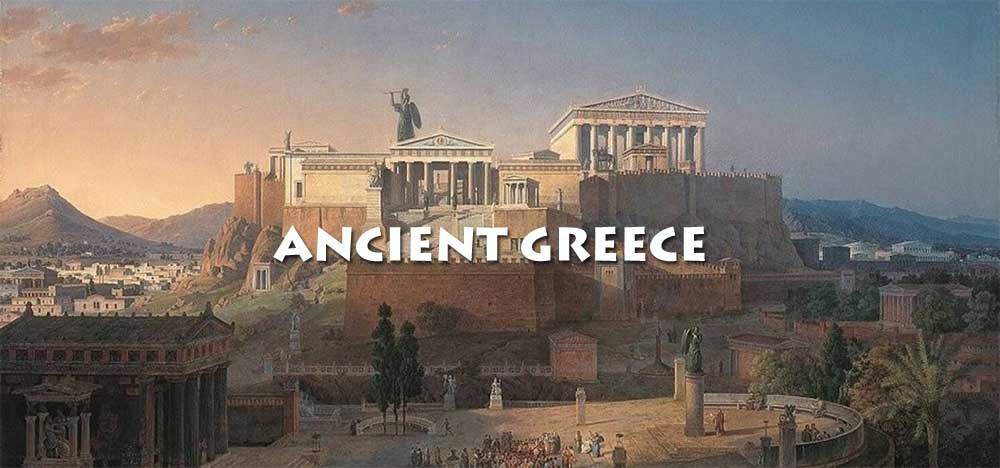Sappho, often hailed as one of the greatest lyric poets of ancient Greece, remains an iconic figure whose works have transcended time, despite most of them surviving only in fragments. Born around 630 BCE on the island of Lesbos, in the town of Mytilene or Eresos, Sappho’s life is shrouded in mystery and myth, with facts often intertwined with legend. Her poetry, however, offers glimpses into her world, her emotions, and the society she lived in, providing a valuable cultural and historical insight into ancient Greek life, particularly the inner lives of women.
 The precise details of Sappho’s life are scarce and largely derived from later ancient biographies that contain a mix of fact and fiction. What is generally agreed upon is that she belonged to an aristocratic family and lived during a time of great cultural flourishing in Lesbos. Ancient sources mention a daughter named Cleis and suggest she may have been married to a wealthy man named Cercylas, although this is debated by scholars as possibly apocryphal.
The precise details of Sappho’s life are scarce and largely derived from later ancient biographies that contain a mix of fact and fiction. What is generally agreed upon is that she belonged to an aristocratic family and lived during a time of great cultural flourishing in Lesbos. Ancient sources mention a daughter named Cleis and suggest she may have been married to a wealthy man named Cercylas, although this is debated by scholars as possibly apocryphal.
Sappho’s Lesbos was a society with vibrant artistic and cultural scenes, and she was part of a thiasos, a community or circle of women who gathered for educational and religious purposes. Her poems frequently reflect the activities and relationships within this circle, highlighting the emotional depth and intensity of female friendships and love.
Poetry and Themes
Sappho’s poetry is renowned for its lyrical beauty, emotional depth, and innovative use of the first-person perspective, which brought a personal and intimate quality to her work. She wrote in Aeolic dialect, and her poems were originally composed to be accompanied by music played on the lyre, hence the term “lyric poetry.”
Her themes are timeless and universal, focusing on love, desire, the beauty of nature, and the human experience. Sappho’s works also touch on the gods and goddesses of the Greek pantheon, weaving religious and mythological references into her exploration of personal and emotional landscapes.
Sappho’s poetry about love and passion, especially directed towards women, has made her a symbol of female homoerotic desire through the ages. The term “lesbian” itself derives from the island of her birth, and “Sapphic” has come to describe women who love women, as well as the metrical form she often used in her poetry.
Love and Relationships in Sappho’s Poetry
Sappho’s poetry is a captivating exploration of love and relationships, delving deep into the complexities of human emotions. Her verses are filled with passion, longing, and desire, painting vivid pictures of intimate connections between individuals. Through her words, she weaves tales of unrequited love, fervent admiration, and profound connections that transcend time.
Sappho’s unique perspective on love celebrates the beauty and intensity of romantic feelings without shying away from the inevitable heartaches that often accompany them. She captures the essence of longing and devotion in a way that resonates with readers across centuries, highlighting the universal nature of human experiences when it comes to matters of the heart.
In Sappho’s poetry, relationships are portrayed as powerful forces that shape lives and inspire creativity. Her lyrical expression elevates love to a divine level, showcasing its transformative power and enduring impact on individuals. Each line is infused with raw emotion and authenticity, inviting readers to immerse themselves in the intricate tapestry of human connections woven by Sappho’s poetic genius.
As you delve into Sappho’s verses on love and relationships, you’ll find yourself captivated by her ability to capture fleeting moments of bliss or sorrow with unparalleled grace. Her words have stood the test of time as a testament to the enduring power of love in all its forms – an eternal muse for poets and romantics alike.
Controversies and Misconceptions Surrounding Sappho
Controversies and misconceptions have shrouded the legacy of Sappho, the ancient Greek poetess from Lesbos. One longstanding debate revolves around her sexuality, with some arguing that she exclusively loved women while others suggest a broader spectrum of love in her poetry. This ambiguity has led to various interpretations over the years.
Another controversy surrounding Sappho is the notion that her work was destroyed or censored due to its queer themes. While it’s true that only fragments of her poems remain today, attributing this solely to censorship might oversimplify a complex historical context.
Additionally, there are misconceptions about Sappho’s personal life and reputation as a teacher at her Academy on Lesbos. Some portrayals depict her as promiscuous or scandalous, which may not accurately reflect the reality of ancient Greece’s societal norms and attitudes towards female poets.
Rediscovery and Preservation of Sappho’s Works
The rediscovery and preservation of Sappho’s works is a tale of mystery and fascination. After centuries of being lost to obscurity, fragments of her poetry began resurfacing in the late 19th and early 20th centuries. Archaeological finds in Egypt played a crucial role in bringing Sappho back into the literary spotlight.
Thanks to dedicated scholars and translators, these fragmented verses were meticulously pieced together like an ancient puzzle, shedding light on Sappho’s lyrical genius. The painstaking efforts to unearth and decipher her poems have allowed modern readers to glimpse into the intimate emotions and vivid imagery that define her work.
Today, Sappho’s legacy endures through various translations and interpretations that continue to captivate audiences around the world. Her words transcend time, resonating with readers who are drawn to the raw emotions and profound insights woven throughout her poetry.
Legacy and Influence
Though much of Sappho’s poetry has been lost to history, with only one complete poem (“Ode to Aphrodite”) and numerous fragments surviving, her influence on the Western literary tradition is profound. Her work was admired by contemporaries and later poets alike, including the likes of Catullus and Ovid, and continues to be studied and celebrated for its beauty, emotional honesty, and innovative lyrical form.
The loss of Sappho’s complete body of work is a significant cultural tragedy, with the majority of her poems known only through quotations by later authors or from fragments found on papyrus scraps. However, the enduring appeal of her fragments attests to her mastery of language, her ability to capture profound emotional truths, and her enduring legacy as a voice of passion and beauty.
Sappho’s legacy extends beyond literature into cultural and feminist symbols. She embodies the voice of female expression and the complexity of women’s lives and relationships, making her an enduring figure in the history of literature and a beacon for the exploration of gender and sexuality in ancient Greece
